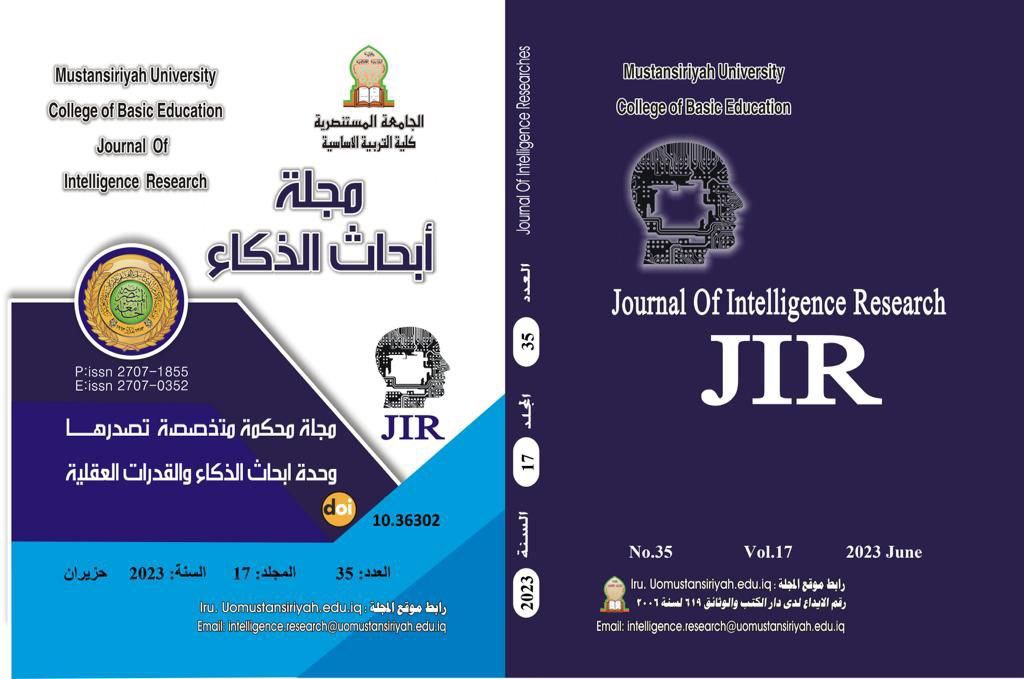Abstract
Targets of the current search:
1- Constructing a measure of collective thinking among of the Kindergarten Department.
2- Measuring group thinking among Kindergarten's students.
3- Identifying the significance of the differences in the degrees of group thinking among the sample members according to the variables (grades(.
To achieve the objectives of the research, the two researchers chose a sample of (200) female students, and the researchers build the research tool (the collective thinking scale) based on Janis' theory (Jans, 1982), then the paragraphs of the scale were analyzed logically and statistically to calculate its discriminatory ability and its validity coefficient (apparent validity, and constructive validity). ), and the stability coefficient for the group thinking scale by the re-test method was (0.852), and by the Alpha Cronbach method (0.803), and the group thinking scale in its final form consisted of (25) items, and it was applied to the research sample of (200) students from the kindergarten department in College of Basic Education / Al-Mustansiriya University for the academic year (2022-2023), in a random stratified manner, and the researchers reach the following results:
1- The kindergarten students enjoy group thinking.
2- There are no statistically significant differences in group thinking among kindergarten students according to the grades.
1- Constructing a measure of collective thinking among of the Kindergarten Department.
2- Measuring group thinking among Kindergarten's students.
3- Identifying the significance of the differences in the degrees of group thinking among the sample members according to the variables (grades(.
To achieve the objectives of the research, the two researchers chose a sample of (200) female students, and the researchers build the research tool (the collective thinking scale) based on Janis' theory (Jans, 1982), then the paragraphs of the scale were analyzed logically and statistically to calculate its discriminatory ability and its validity coefficient (apparent validity, and constructive validity). ), and the stability coefficient for the group thinking scale by the re-test method was (0.852), and by the Alpha Cronbach method (0.803), and the group thinking scale in its final form consisted of (25) items, and it was applied to the research sample of (200) students from the kindergarten department in College of Basic Education / Al-Mustansiriya University for the academic year (2022-2023), in a random stratified manner, and the researchers reach the following results:
1- The kindergarten students enjoy group thinking.
2- There are no statistically significant differences in group thinking among kindergarten students according to the grades.
Keywords
Group thinking
Kindergarten's students
Abstract
- بناء مقياس التفكير الجماعي لدى طالبات قسم رياض الأطفال.
2- قياس مستوى التفكير الجماعي لدى طالبات قسم رياض الأطفال.
3- التعرف على دلالة الفروق في مستوى التفكير الجماعي لدى طالبات قسم رياض الاطفال على وفق متغير (الصفوف الدراسية).
ولتحقيق أهداف البحث إختار الباحثان عينة مؤلفة من (200) طالبة، وقام الباحثان ببناء (مقياس التفكير الجماعي) إعتماداً على نظرية جانيس (Jans,1982)، ثم حللت فقرات المقياس منطقياً وإحصائياً لحساب قدرته التمييزية ومعامل صدقه (الصدق الظاهري، وصدق البناء)، وقد بلغ معامل الثبات لمقياس التفكير الجماعي بطريقة إعادة الإختبار (0.852)، وبطريقة الفاكرونباخ (0.803)، وتكون مقياس التفكير الجماعي بصيغته النهائية من (25) فقرة، وتم تطبيقه على عينة البحث البالغة (200) طالبة من طالبات قسم رياض الأطفال في كلية التربية الأساسية/ الجامعة المستنصرية للعام الدراسي (2022- 2023)م، بطريقة عشوائية طبقية، وتوصل الباحثان الى النتائج الآتية:
1- إن طالبات قسم رياض الأطفال يتمتعّن بالتفكير الجماعي.
2- عدم وجود فروق ذات دلالة إحصائية في التفكير الجماعي لدى طالبات قسم رياض الأطفال وفقاً للصفوف الدراسية.
2- قياس مستوى التفكير الجماعي لدى طالبات قسم رياض الأطفال.
3- التعرف على دلالة الفروق في مستوى التفكير الجماعي لدى طالبات قسم رياض الاطفال على وفق متغير (الصفوف الدراسية).
ولتحقيق أهداف البحث إختار الباحثان عينة مؤلفة من (200) طالبة، وقام الباحثان ببناء (مقياس التفكير الجماعي) إعتماداً على نظرية جانيس (Jans,1982)، ثم حللت فقرات المقياس منطقياً وإحصائياً لحساب قدرته التمييزية ومعامل صدقه (الصدق الظاهري، وصدق البناء)، وقد بلغ معامل الثبات لمقياس التفكير الجماعي بطريقة إعادة الإختبار (0.852)، وبطريقة الفاكرونباخ (0.803)، وتكون مقياس التفكير الجماعي بصيغته النهائية من (25) فقرة، وتم تطبيقه على عينة البحث البالغة (200) طالبة من طالبات قسم رياض الأطفال في كلية التربية الأساسية/ الجامعة المستنصرية للعام الدراسي (2022- 2023)م، بطريقة عشوائية طبقية، وتوصل الباحثان الى النتائج الآتية:
1- إن طالبات قسم رياض الأطفال يتمتعّن بالتفكير الجماعي.
2- عدم وجود فروق ذات دلالة إحصائية في التفكير الجماعي لدى طالبات قسم رياض الأطفال وفقاً للصفوف الدراسية.
Keywords
التفكير الجماعي، طالبات قسم رياض الأطفال
